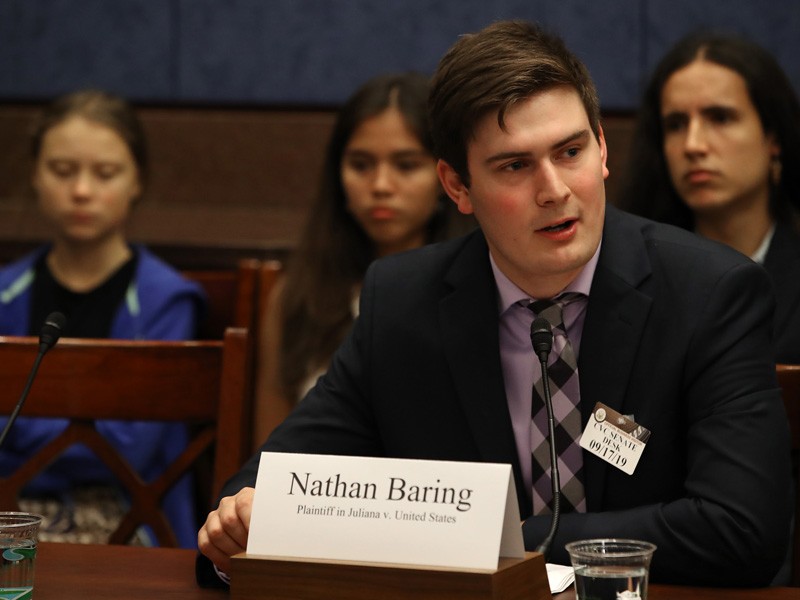When Gustavus Adolphus College junior Nathan Baring found out he was a finalist for the prestigious Truman Scholarship, he had two immediate reactions: first, he was humbled. Then, he wondered what made him stand out as a candidate and how he could lean into that and improve his candidacy before his last interview that will help determine whether he is awarded one of the scholarships.

This hardworking, problem-solving mindset is common for the political science and biology double major. Baring has been committed to environmental activism for years, and at 15 years old became one of the plaintiffs in Juliana v. United States, a landmark lawsuit by young people alleging the federal government endangered their futures by not taking action against climate change.
Being named a finalist for the Truman Scholarship is an extension of Baring’s commitment to environmental activism, as well as his passion for protecting both the climate and people in his home state of Alaska.
That’s because the scholarship application involves a nomination from one’s undergraduate institution, three additional letters of recommendation, a recent transcript, a 14-question application, and a policy proposal.
“I really liked that part of the Truman application,” Baring said when asked what was included in his policy proposal. “Let me preface by saying it was really niche.”
Baring went on to explain the policy he wrote about, which is similar to former President Obama’s Northern Bering Sea Climate Resilience Executive order.
“Because of climate change, there is less and less sea ice on the North Coast of Alaska. Essentially what’s happening is three new shipping lanes are opening up, which is going to make shipping times far faster,” Baring said.
However, these shipping lanes also have environmental implications that the 2016 executive order was issued to address. Baring’s proposal, however, takes a unique look at how the people in the area could be affected.
“Former laws did not give enough deference to tribes in the region,” Baring said. “My policy proposal was extending a roughly one-mile coastal line around tribal/indigenous villages so we can talk about how those tribes wanted to approach the new traffic.”

This kind of careful thought is exactly what Dr. Pamela Kittelson saw in Baring, and why she encouraged him to apply for the Truman Scholarship.
“I encouraged [Baring] to apply to Truman because he had a strong record of public service—he has interned in D.C. (Senator Murkowski), interned in Alaska for a state representative and with Alaska Legal Services Corporation where he worked with Tanana Chiefs Conference (TCC), a consortium of Alaska’s interior tribes,” said Kittelson, who serves as a professor in biology and environmental studies and coordinator in the Fellowships Office. “I am thrilled that such a prestigious national award has recognized [Baring’s] existing record and future potential.”
After Gustavus, Baring has big plans including working in Washington D.C. for a year, getting a master’s degree in rural development, working in grant management, and eventually going to law school.
But despite all his big plans and achievements, Baring still remains down-to-earth and thankful for everyone who has helped him so far on his journey, especially Dr. Kittelson.
“If it weren’t for [Dr. Kittelson] being an exceptional mentor who really understands the application process, I wouldn’t be even close to where I am now,” Baring said. “She acts as the liaison between powerful organizations like Truman and students. That’s how Gustavus is leading in so many amazing scholarships.”
Kittelson highlighted that being a finalist for the Truman Scholarship is an honor itself.
“To paraphrase Tara Yglesias (Deputy Executive Secretary of the Truman Foundation), ’If a school can produce finalists with some regularity, the institution is identifying and helping to present the students in the best light. The Truman Foundation considers having finalists, not Scholars to be a true marker of the success of an individual institution.’ It’s exciting that Gusties are competitive for this award; we have had three finalists in the last five years,” Kittelson said.
More information about how the Gustavus Fellowships Office supports students is available on the Gustavus website, and additional details about the Harry S. Truman Scholarship and associated foundation can be found online.

Leave a Reply
You must be logged in to post a comment.